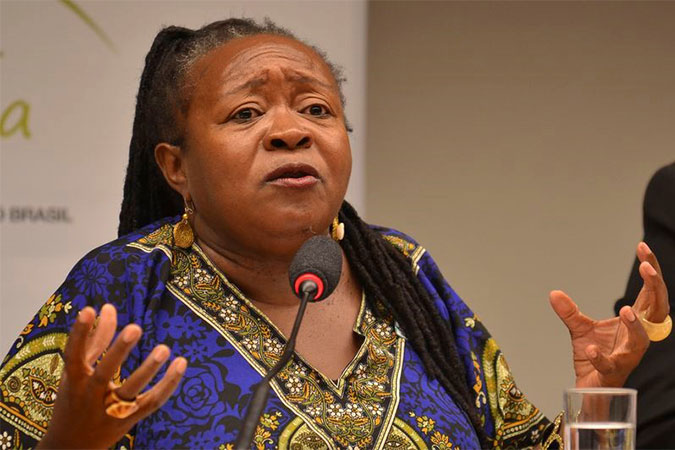Brazil commemorates week of appreciation for domestic workers
Date:

In Brazil, the National Domestic Workers’ Day is commemorated on April 27, and appreciation activities were held throughout the week. In Salvador, a special session was held in the City Hall, together with mobilizations of domestic workers. Meanwhile, in Sao Paulo, public events were organized with support of the Central Workers’ Union (CUT) and the Inter-American Trade Union Institute for Racial Equality (Inspir).
UN Women interviewed Creuza Oliveira, Secretary General of the National Federation of Domestic Workers (FENATRAD) and member of UN-Women’s Civil Society Advisory Group in Brazil.
Creuza highlights the achievements of domestic workers in the country in terms of labor legislation, as well as their long trajectory of social mobilization: "We have about 80 years of union organization. We have made important progress, but, like other workers, we now face the risk of a historic setback in terms of labor and welfare reforms. "
Four years ago, domestic workers were recognized for the same labor rights established in the 1988 Constitution for all other categories of work. For more than 25 years, paid domestic work was the only professional category with less labor rights in the country. Creuza comments: "We know that we risk losing the rights that we attained so recently, including fixing maximum hours of work per week, pension, and overtime pay."
In 2015, paid domestic work was the occupation of 18% of Afro-descendant women and 10% of white women in Brazil. During the last 20 years, the average income of domestic workers grew by 64% due to the appreciation of the minimum wage and the increase in the formalization of the sector. Despite this, average income in 2015 did not even match the minimum wage (739 reais versus the minimum wage of 788 reais, about USD 250 a month).
One of the challenges raised by Creuza refers to the increase in the proportion of unregistered female domestic workers, which is accentuated in the case of black women. They accounted for 18.3% of this category in 1995, a figure that reached 31.7% in 2015. Among white female domestic workers, 34.1% work in more than one household, which allows higher income but less access to labor rights and social protection. "We had an increase in the formalization of the employment of domestic workers, but there was also a growth in the number of unregistered workers, who are in a precarious situation of subcontracting," diluted.
Creuza also reveals that the average age of domestic workers increased and the number of girls and adolescents in domestic work fell at the national level and in large cities, although not at the desired pace. "We know that in the suburbs and in the interior, girls and adolescents continue to work. To end this, we are actively denouncing the situations and developing awareness campaigns against child and youth labor. The place of children and adolescents is school. "
Creuza's concerns are in line with the implementation of the 2030 Sustainable Development Agenda, approved by the Member States of the United Nations in 2015, focused on prioritizing vulnerable people and leaving no one behind.
As one of the most vulnerable groups, faced with racism and sexism, domestic workers continue to mobilize to exercise their rights. "We are still struggling for our right to housing, to the daily care of children, to full time schooling and for the expansion of our rights, we do not want setbacks." says Creuza.
International Labor Organization (ILO) Convention 189 on Decent Work for Domestic Workers is a priority for the domestic workers' movement in Brazil. "More than 20 countries have ratified the Convention, but this is not the case in Brazil. We want ratification and we will fight for it," she says.
Creuza concludes: "We must not stop dreaming; we cannot let setbacks discourage us. We must participate in unions, in organizations that promote gender, racial and social issues. We take inspiration in the leadership of so many women and men, like Zumbi, Dandara, Luiza Mahin, Luiz Gama, Lélia Gonzalez or Luiza Barrios and we have to advance their conquests without hesitation.”
*Figures published in Retrato das Desigualdades de Gênero e Raça, Ipea, 2017.